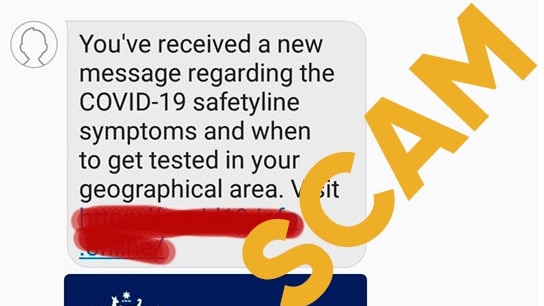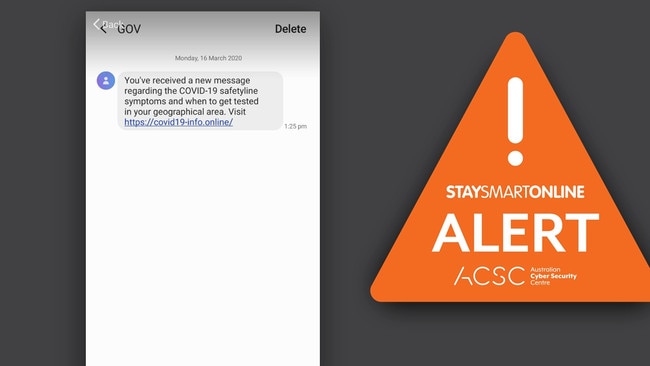Scammers use COVID-19 to target Australians for money and personal details
While Australians continue to navigate the treacherous waters of the coronavirus pandemic, cold-hearted scammers are using it as a way to steal money and personal details from anxious and vulnerable people. Here’s what to look out for.

This coronavirus article is unlocked and free to read in the interest of community health and safety. For full access to trusted news from the Leader and Herald Sun, get a free four-week digital subscription here.
As the COVID-19 pandemic grips the world, Australians are being thrown other curveballs in the form of distasteful scams.
Scammers are using technology to prey on the fears people have about coronavirus.
Some of the scams include trying to sell products they claim can prevent or cure the virus.
Since January 1, the Australian Competition and Consumer Commission has received 94 reports of scams about coronavirus, with the agency saying they believe those figures are climbing.
“We’ve had a wide variety of scams reported to us, including fake online stores selling products claiming to be a vaccine or cure for coronavirus, and stores selling products such as face masks and not providing the goods,” ACCC Deputy Chair Delia Rickard said.
“There is no known vaccine or cure for coronavirus and a vaccine isn’t expected to be available for 18 months. Do not buy any products that claim to prevent or cure you of COVID-19. They simply don’t exist.”

Alarmingly, Australians lost almost $5m more to scams this February ($14,415,014) compared to February 2019 ($9,882,248).
Ms Rickard said scammers are impersonating official organisations such as the World Health Organisation and the Department of Health or legitimate businesses such as travel agents and telecommunications companies.
“Understandably, people want information on the pandemic, but they should be wary of emails or text messages claiming to be from experts,” Ms Rickard said.
A Bayside resident, who asked to remain anonymous, said she received a message from someone pretending to be from the Commonwealth Bank.
“They asked if I had authorised a purchase on Store 8 and they had a link,” she told the Leader.
“It was from a random mobile number and the fact it was from a random mobile number made me realise it was a scam.
“At first I thought it was legit because you don’t expect to get messages like that too often, then when I realised it was a scam I was really annoyed.
“I feel like people are losing their jobs and vulnerable mentally and to do something like that is pretty low.”

She said she immediately blocked the number and deleted the message before alerting her family to the scam.
“Check who it is from, the number it is from, and block the number and report it if you know who to report it to,” she said.
The ACCC has outlined the following scams to look out for and what to do if you come across one.
Common types of coronavirus scams
■ phishing emails and phone calls impersonating organisations and people such as the World Health Organisation, government authorities, people confirmed to have the coronavirus, and legitimate businesses such as travel agents and telecommunications companies
■ people receiving misinformation about the coronavirus, being sent by text, social media and email
■ products claiming to be a vaccine or cure for the coronavirus
■ investment scams claiming coronavirus has created opportunities.
How to protect yourself
■ Be aware of fraudulent emails claiming to be from virus experts. For the most up-to-date information about the coronavirus, visit the Department of Health and the World Health Organisation (WHO).
■ Be careful of fake online shopping sites requesting unusual payment methods such as upfront payment via money order, wire transfer, international funds transfer, preloaded card or electronic currency, like Bitcoin.
■ The best way to detect a fake trader or social media online shopping scam is to search for reviews before purchasing. No vaccine or cure presently exists for the coronavirus.
■ Don’t let anyone pressure you to make quick decisions.
■ Don’t click on links from sources you don’t know.
■ Never respond to unsolicited messages and calls that ask for personal or financial details — delete or hang up.
■ Always keep your computer security up to date with antivirus and anti-spyware software, and a good firewall.
■ If you are planning to donate, check the terms and conditions of funding platforms and ensure you are dealing with official organisations.
■ If you are donating to an established charity check the Australian Charities and Not-for-profits Commission Charity Register.
■ Stay up to date with latest consumer advice relating to COVID-19 at: www.accc.gov.au/covid-19.
MORE NEWS:
BAYSIDE CORONAVIRUS CASES GROW AS COUNCIL URGES STRICT DISTANCING
BAGS OF COMMUNITY LOVE AND CARE FOR EMERGENCY WORKERS
SOUTHEAST CRIME HOT SPOTS REVEALED
If you think you have been scammed, contact your bank or financial institution immediately.
More information on coronavirus scams is available on the Scamwatch website, including how to make a report and where to get help.
